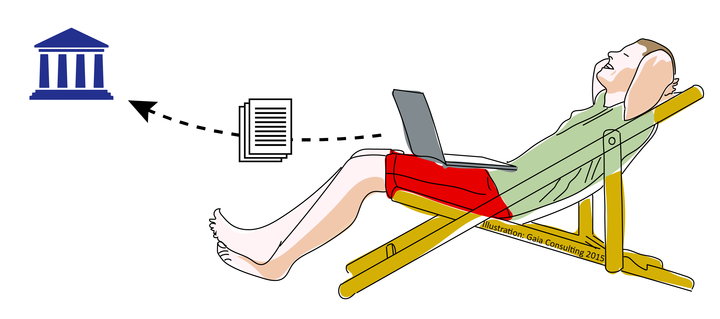Telecommuting and flexible work could improve corporate productivity, keep employees happy, and cut costs and carbon emissions.
Striving towards higher productivity, effectiveness and reduced operational costs, coupled with technological development, digitalisation and globalisation are creating new momentum for telecommuting, i.e. working from home. On the other hand, increased attention to corporate social responsibility and environmental issues is also working in favour of flexible working methods and telecommuting. Social responsibility programmes aim to keep employees happy, loyal and healthy e.g. by offering them flexibility. Commuting is a significant source of greenhouse gas emissions at service organisations.
Flexible work and telecommuting could reduce environmental impacts and carbon emissions, improve risk management and help to achieve a better balance between work and life but they have to be planned carefully.
Telecommuting is nothing new. Its potential benefits have been touted for decades, and optimistic studies in the 1990s predicted a massive movement from traditional working patterns, with the help of new information technology. Flexible working on the road, at airports, at a client’s office, at home or from a holiday home is reality in many parts of the world. For example, about one third of all service sector employees in Finland are at least partly telecommuting and at least 40% of the entire workforce have a possibility of telecommuting or multi-locational work.
Still, a vast amount of new evidence shows that telecommuting does not suit all and there are great differences in attitudes towards it in different cultures as well as in different management cultures. Negative experiences of telecommuting include both social and technical problems. Employees working from home can end up working much more, and may have a higher risk of burnout. Working out of the supervisors’ sight can lead to isolation and weaken career development. Staff may also feel lonely and long for collegial feedback, proper monitoring of their work results and constructive support.
Technical problems, such as IT, data security and communication issues, are rather common with telecommuting. Choosing the right devices and systems require technical insight. However, technology is not the bottle neck of telecommuting. ICT companies have developed numerous products and services to enable it.
According to studies, many of the problems related to telecommuting originate from organisational issues. Telecommuting can generate mistrust and misunderstanding if implemented without proper guidance and without setting simple enough rules on costs, content of work, responsibilities, reporting and communications. Moreover, not all employees want to telecommute and not all supervisors are capable or willing to adjust their management patterns to suit telecommuting.
Telecommuting can be a success but it often requires that the organisation’s management system is amended accordingly. Telecommuting can bring practical benefits both to employers and employees. Reported advantages for employees include better physical endurance and mood, improved motivation, better focus and effectiveness in critical tasks, improved balance between work and life, flexible timetables and a possibility to live in less expensive locations. Reportedly, telecommuters work more effectively and put in longer hours.
From an employer’s perspective flexible working can be an important factor in being able to recruit the most sought-after employees, as well as in improving effectiveness and productivity. Societal and environmental benefits include less commuter traffic and less traffic congestion, improved mobility in cities, and better chances to achieve climate change mitigation goals. It is estimated that if 10% of employees in the EU-25 countries telecommuted once every week, traffic-related emissions could be reduced by more than 22 million tonnes of CO2.
P.S. This column was written while telecommuting.
Pasi Rinne
Chairman of Gaia Group
Environment, Corporate Responsibility, Climate, Disaster Management
pasi.rinne@gaia.fi
+358 400 464 127


